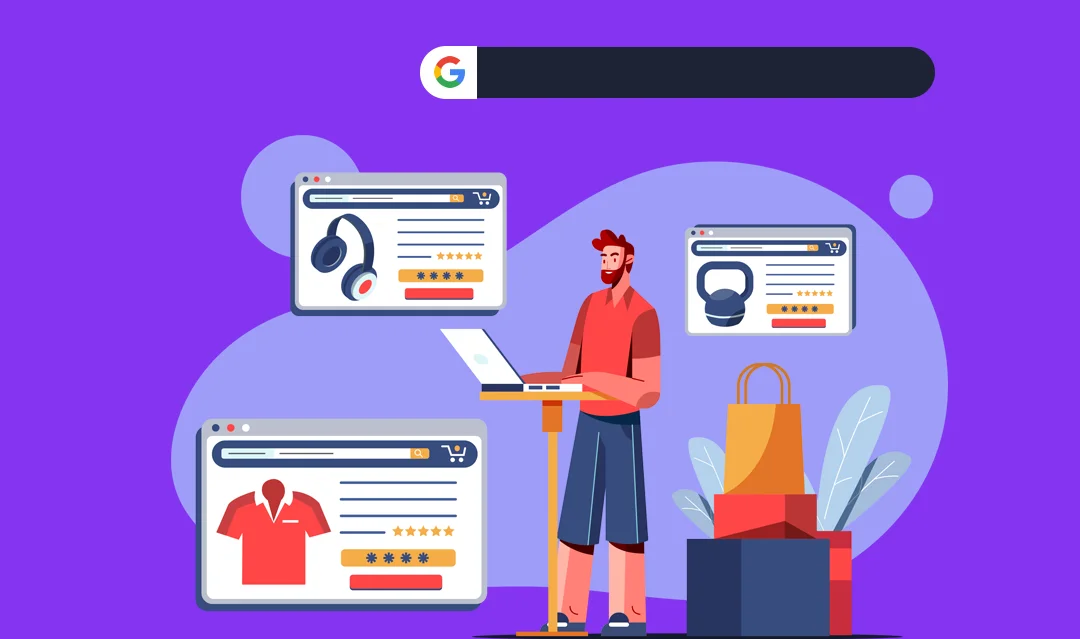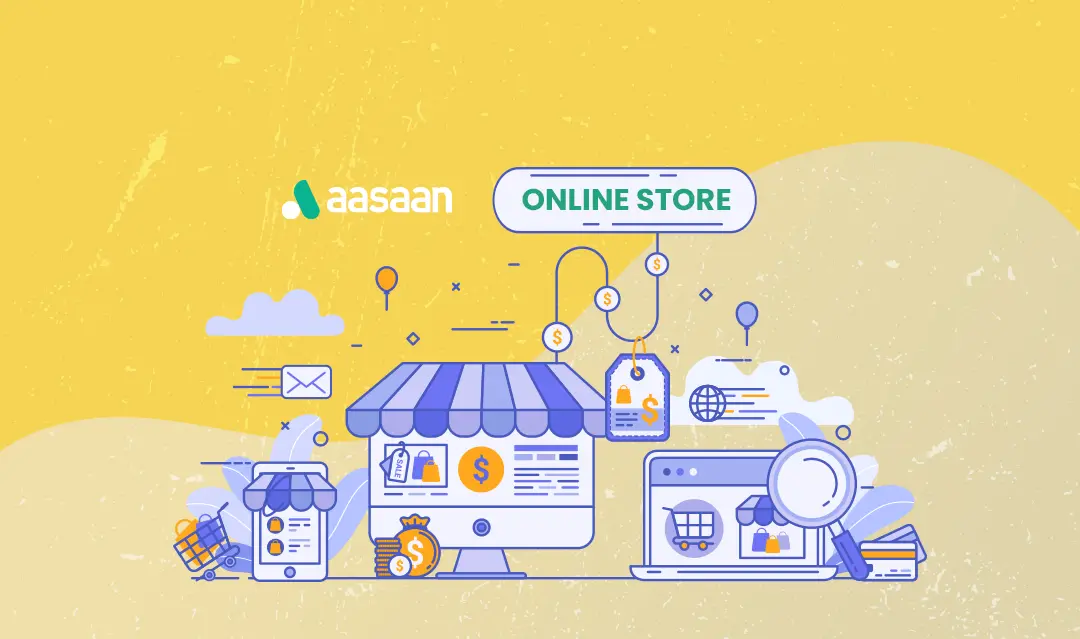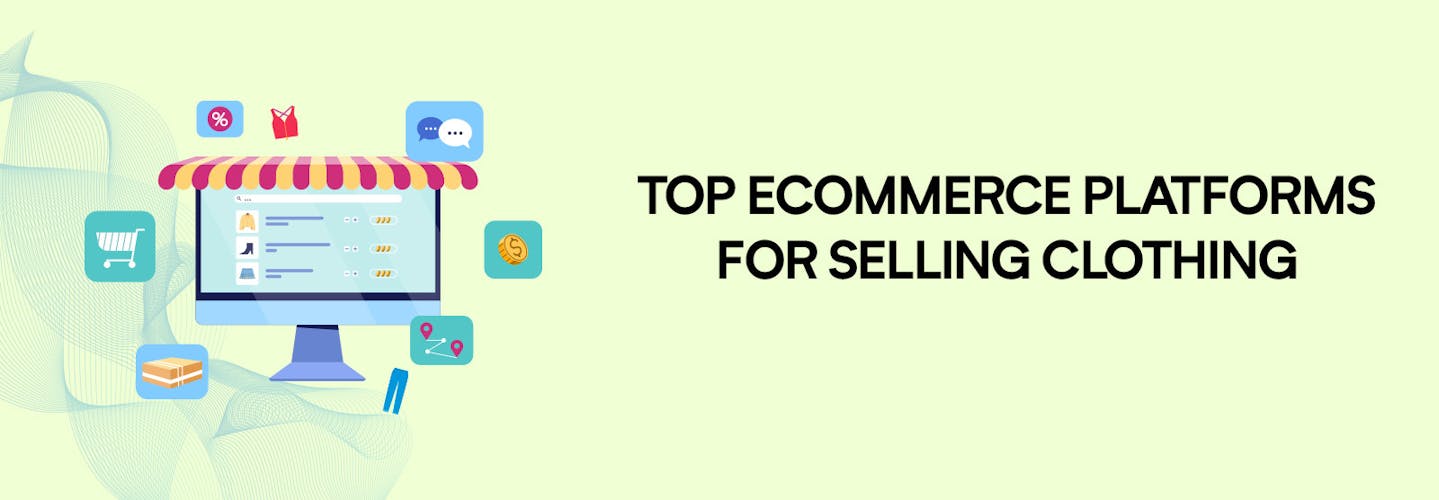
Best Ecommerce Platform for selling Clothing: A Comprehensive Guide in 2025.
If you are planning to launch an online clothing store, one of the most important decisions you will make is choosing the right ecommerce platform.
With so many options available, it can be overwhelming to choose the one that suits your business needs the best.
Here the some statics about online apparel business:
- E-commerce revenues from apparel and accessories sales are expected to continue to grow through 2027 in the US.
- In 2022, there were a total of 268 million digital buyers in the United States, and this number is expected to reach 285 million by 2025.
- Online retailers made up 12.4% of total retail sales in terms of value in the third quarter of 2021.
- Impulse purchases are common in online fashion shopping.
- The rise of resale is also a trend in the online fashion industry.
In this article, we will discuss the best ecommerce platforms for clothing businesses and help you make an informed decision.
What is an Ecommerce Platform ?
An ecommerce platform is a software or service that allows businesses to sell their products or services online.
It provides a range of features and tools that help businesses manage their online stores, including product catalog management, order processing, payment gateways, shipping and delivery management, and marketing and analytics tools.
Ecommerce platforms are essential for businesses that want to reach a wider audience and sell their products online.
With the rise of ecommerce, more and more consumers are shopping online, and businesses need to have a strong online presence to remain competitive.
Why is Choosing the Right Ecommerce Platform Important for Clothing Businesses?
The ecommerce platform is the backbone of your online store. Choosing the wrong platform can lead to a subpar user experience, which can hurt your reputation and sales.
- Different ecommerce platforms offer different features and capabilities. Choosing the right platform can help you better manage inventory, handle transactions, and provide customer support, among other things.
- A good ecommerce platform can help you save time and money. It can automate tasks like order management and shipping, freeing up your time to focus on other aspects of your business.
- Choosing the right ecommerce platform can help you scale your business. If you plan on growing your store, you’ll need a platform that can support that growth and provide the tools you need to succeed.
- Security is a major concern for online shoppers. Choosing a reputable and secure ecommerce platform can help build trust with your customers and protect their sensitive information.
- Your ecommerce platform can impact your search engine rankings. Choosing a platform that is optimized for search engines can help improve your visibility and attract more traffic to your site.
- The right ecommerce platform can help you stand out from your competition. By choosing a platform that offers unique features or integrates with third-party tools, you can differentiate yourself from other online apparel stores.
Factors to Consider When Choosing an Ecommerce Platform
When choosing an ecommerce platform for a clothing business, several factors should be considered:
1.Pricing:
Look for a platform that offers affordable pricing and flexible payment plans that suit your budget and business needs.
2.Features:
Make sure the platform offers all the features and tools you need to manage your online store efficiently, from product catalog management to payment gateways and shipping and delivery management.
3.Ease of Use:
Look for a platform that is easy to use and requires minimal technical knowledge or expertise to set up and manage.
4.SEO Capabilities:
Look for a platform that offers SEO tools and features that can help optimize your online store for search engines and drive traffic to your website.
5.Mobile Responsiveness:
Look for a platform that offers mobile-responsive themes and templates that can provide customers with a seamless shopping experience on their mobile devices.
6.Payment Options:
Look for a platform that offers a variety of payment options, including credit card payments, PayPal, and other popular payment gateways.
7.Customer Support:
Look for a platform that offers reliable customer support and technical assistance to help you resolve any issues or problems that may arise.
Top 5 Best Ecommerce Platforms for selling clothing
If you’re a small or midsize ecommerce business owner looking to build an online storefront that can compete with the top brands in the industry, you need the best ecommerce website builder for clothing. And that’s where aasaan comes in.
1. Aasaan:
At aasaan, we understand the challenges that come with building an online store.
That’s why we’ve developed a powerful zero-code platform that makes it easy for anyone to create stunning online storefronts and mobile apps, without any technical skills required.
With aasaan, you can achieve your goals faster, at a lower cost, and with all the features you need to succeed.
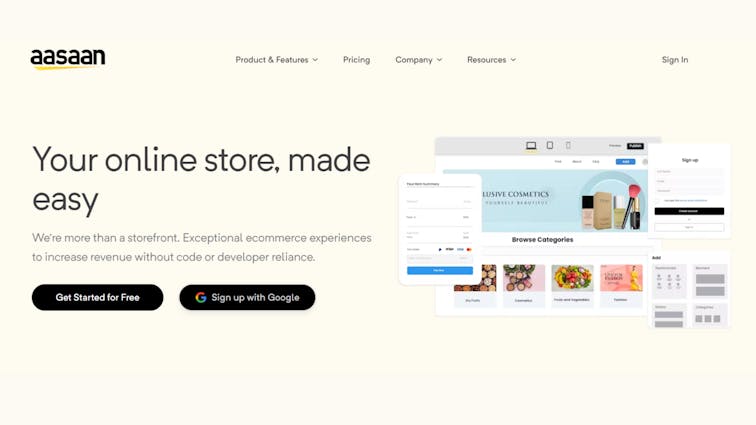
Here are just some of the reasons why aasaan stands out as the best ecommerce website builder:
a. One-Click Migration
If you’re currently on Shopify or Amazon, migrating to aasaan is incredibly easy. With just one click, you can move all your products, customers, orders and data to our platform.
b. Advanced SEO Features
Our ecommerce platform is designed to convert sales with advanced SEO features. We make sure your website is optimized for search engines like Google, so that your customers can find you easily.
c. FOMO Badges
We use FOMO (Fear Of Missing Out) badges to create urgency and motivate customers to make a purchase. These badges highlight limited-time offers, low stock warnings, and other incentives to drive sales.
d. Speed & Performance
aasaan’s ecommerce platform is lightning-fast, ensuring that your customers have an excellent user experience while browsing and buying from your online store.
e. AI Features & Integrations
With aasaan, you get powerful AI features and integrations that help you automate processes and scale your business. These features include intelligent product recommendations, email marketing campaigns, social media integrations and more.
2. Shopify:
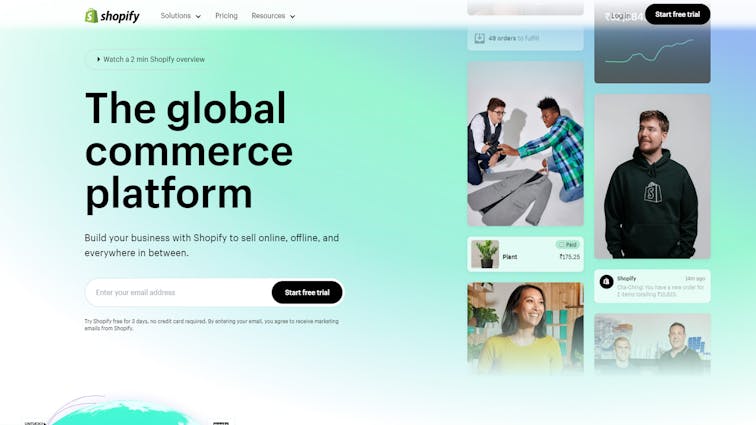
Shopify is an e-commerce platform that was founded in 2006 and has since become one of the most popular e-commerce platforms in the world. It’s designed to make it easy for anyone to start an online store and sell products or services to customers all around the world.
It is well-known for its user-friendly interface, which makes it easy for both store administrators and customers to navigate websites.
This feature is a strong signal of Shopify’s commitment to providing a great user experience. Additionally, Shopify offers 24/7 phone support, which is a great resource for those who may have difficulty with the backend, regardless of their location.
In terms of pricing, Shopify’s subscription model is quite affordable. The basic plan is $29 per month, while the Shopify and Advanced Shopify plans cost $79 and $299 per month, respectively.
These plans offer essential e-commerce functionalities, and the higher the price, the more features are included. It is important to choose the plan that best suits your business’s needs. Shopify also offers a 14-day free trial, so you can try it out before committing to a plan.
3. Woocommerce:
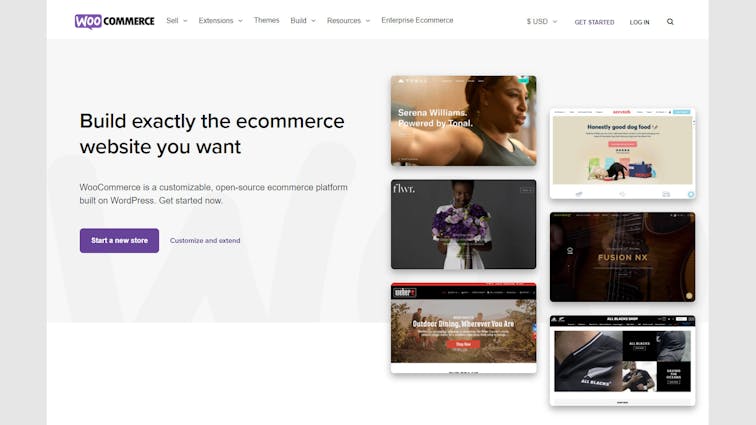
WooCommerce is a popular e-commerce platform that runs on WordPress. It offers a range of features, including customizable themes and plugins, payment and shipping options, and product management tools.
One of the benefits of WooCommerce is that it is free to use, but there are additional costs associated with using certain extensions or add-ons.
WooCommerce is known for its flexibility and scalability, allowing businesses to customize their online store to fit their specific needs. However, it may require more technical knowledge and development expertise compared to other e-commerce platforms.
In terms of support, WooCommerce offers documentation and a user forum, but does not provide 24/7 phone support like Shopify. Pricing for additional extensions or add-ons can vary widely, so it is important to research and budget accordingly.
Overall, WooCommerce can be a good option for businesses with WordPress experience and technical knowledge, but may require more development expertise compared to other e-commerce platforms.
4. Magento:
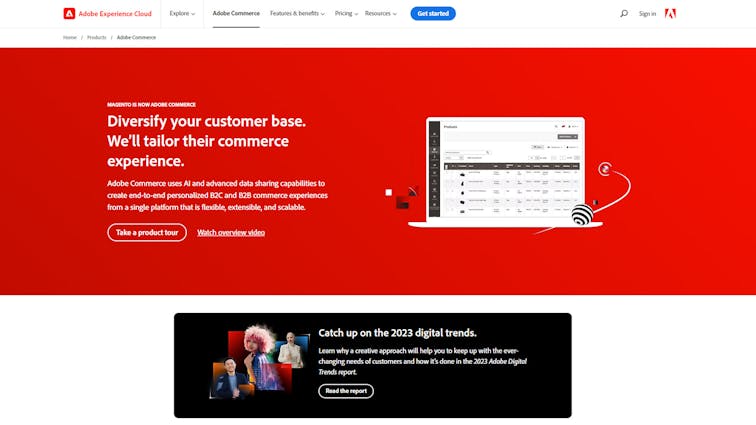
Magento is an open-source e-commerce platform that offers a range of features for businesses of all sizes. It provides a flexible and scalable solution, with customizable themes and extensions that allow for a personalized online store.
One of the benefits of Magento is its robustness and ability to handle large product catalogs and high levels of traffic. It also offers advanced features for marketing, search engine optimization, and mobile responsiveness. However, Magento may require more technical expertise to set up and maintain compared to other e-commerce platforms.
In terms of support, Magento offers documentation and a user forum, as well as phone and email support for its paid version, Magento Commerce. Pricing for Magento Commerce is determined by the size and complexity of the business, so it may not be as affordable for smaller businesses.
Overall, Magento can be a good option for businesses with technical knowledge and the need for advanced features, but may not be as user-friendly or cost-effective as other e-commerce platforms for smaller businesses.
5. Bigcommerce:
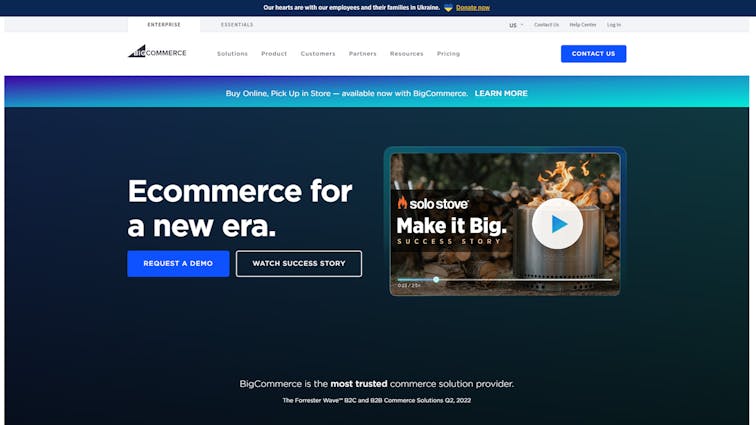
BigCommerce is a cloud-based e-commerce platform that provides a range of features for businesses of all sizes. It offers customizable templates, payment and shipping options, and product management tools, as well as advanced features for marketing and search engine optimization.
One of the benefits of BigCommerce is its ease of use and intuitive interface, making it accessible for businesses with limited technical expertise. It also provides a scalable solution that can handle high levels of traffic and large product catalogs.
In terms of support, BigCommerce offers 24/7 phone, email, and chat support, as well as documentation and a user forum. Pricing is based on the size of the business, with plans ranging from $29.95 to $299.95 per month.
While it may be more expensive than some other e-commerce platforms, BigCommerce offers a wide range of features and a user-friendly interface.
Overall, BigCommerce can be a good option for businesses of all sizes, particularly those with limited technical expertise, looking for a scalable and user-friendly e-commerce platform with advanced features for marketing and SEO.
How to Choose the Right Ecommerce Platform for Your Clothing Store?
Once you’ve considered the essential features and looked at the top ecommerce platforms for selling clothing, it’s time to choose the right one for your store. Here are some steps you can follow:
1. Identify your needs:
Start by making a list of your specific requirements, such as the number of products you want to sell, the type of clothing you are selling, and the level of customizability you need.
2. Consider your budget:
Ecommerce platforms come at different price points, so you need to consider how much you are willing to spend.
3. Research the platform:
Look at the platform’s features, customer support, and reviews to determine if it’s the right fit for your store.
4. Try before you buy:
Most ecommerce platforms offer a free trial, so take advantage of it and test out the platform before committing.
5. Think about scalability:
As your business grows, you will need a platform that can handle the increased traffic and sales. So, choose a platform that can scale with your business.
6. Look at integrations:
Make sure the platform you choose integrates with other tools and services you use, such as shipping providers and accounting software.
By following these steps, you can choose the right ecommerce platform that meets your business needs and helps you grow your online apparel store.
RELATED: 9 Tips on How To Take Pictures of Clothes To Sell Online
Tips for Building a Successful Clothing Ecommerce Store
Building a successful clothing ecommerce store can be a daunting task, but by following a few tips, you can increase your chances of success. Here are five tips for building a successful clothing ecommerce store:
1. Define Your Brand
One of the most important things you can do when building a clothing ecommerce store is to define your brand. Your brand should be consistent across your website, social media accounts, and marketing materials.
Make sure your brand messaging, tone, and visuals align with your target audience and the type of clothing you’re selling.
2. Create a User-Friendly Website
Your website is your storefront, and it’s important to make it easy for customers to find what they’re looking for.
Create a user-friendly website by using clear navigation, high-quality images, and concise product descriptions.
Make sure your website is mobile-friendly, as more and more customers are shopping on their mobile devices.
3. Optimize for SEO
Search engine optimization (SEO) is the process of improving your website’s visibility on search engines like Google.
By optimizing your website for SEO, you can increase your chances of appearing higher in search engine results, which can drive more traffic to your website. Make sure to use relevant keywords in your website copy, product descriptions, and image alt tags.
4. Offer a Variety of Payment Options
It’s important to offer a variety of payment options to make it easy for customers to purchase your products.
In addition to credit card payments, consider offering alternative payment options like PayPal, Apple Pay, or Google Wallet. The more payment options you offer, the more likely customers are to complete their purchase.
5. Focus on Customer Service
Finally, focusing on customer service is crucial for building a successful apparel ecommerce store. Make sure to provide clear and helpful communication with customers, offer fast and reliable shipping, and handle returns and refunds with care.
By providing excellent customer service, you can build a loyal customer base and encourage repeat business.
Conclusion:
Choosing the right ecommerce platform is crucial for the success of your clothing business. By considering factors such as pricing, features, ease of use, SEO capabilities, mobile responsiveness, payment options, and customer support, you can make an informed decision.
aasaan, Shopify, WooCommerce, Magento and BigCommerce are among the best ecommerce platforms for apparel businesses. By following the tips provided, you can build a successful clothing ecommerce store and achieve your business goals.
If you’re ready to start your online clothing store, Why not give it a try and use aasaan.
FAQ’S:
1. What features should I look for in an ecommerce platform for selling clothing?
Some important features to consider when choosing an ecommerce platform for selling clothing include the ability to showcase your products with high-quality images, easy navigation and search functionality, robust inventory management, and support for various payment and shipping options.
2. Can I customize the design of my online clothing store?
Yes, most ecommerce platforms offer customization options that allow you to tailor the design of your online store to your specific brand and audience. This can include choosing from a variety of pre-designed templates or creating a custom design from scratch.
3. What kind of support can I expect from an ecommerce platform?
The level of support you can expect from an ecommerce platform will vary depending on the platform you choose. Look for platforms that offer comprehensive documentation, helpful customer support resources, and a community of other sellers who can provide guidance and advice.
4. What ecommerce platform is best for selling clothing?
There are several ecommerce platforms that are well-suited for selling clothing, such as Shopify, WooCommerce, and BigCommerce. Each has its own set of features and benefits, so it’s important to consider your specific needs and goals before choosing a platform.



